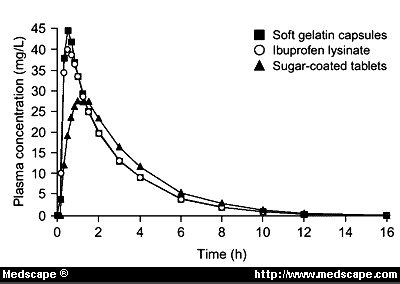Ibuprofen 200mg half life
Long-term ingestion of combinations of analgesics has been associated with analgesic nephropathy. It is therefore appropriate that patients be discouraged from long-term, unsupervised consumption of analgesics, particularly in combination. Patients should therefore be directed to consult a physician if their underlying condition requires administration of ibuprofen for more than 5 days. Ibuprofen usually should not be administered along with acetaminophen or ASA. Patients with any serious medical condition should consult a physician before using ibuprofen as an analgesic or antipyretic.
The platelet inhibiting effects of ibuprofen, although less potent and of shorter duration than those induced by ASA, warrant cautionary supervision by a physician before coadministration of ibuprofen and anticoagulants. Several short-term controlled studies failed to show that ibuprofen significantly affected prothrombin time or a variety of other clotting factors when administered to individuals on coumarin-type anticoagulants.
However, bleeding has been reported when ibuprofen and other NSAID agents have been administered to patients on coumarin-type anticoagulants. Single dose bioavailability studies in normal volunteers have failed to show an effect of ASA on ibuprofen blood levels. Correlative clinical studies have not been done. The addition of ibuprofen to a pre-existent prescribed NSAID regimen in patients with a condition such as rheumatoid arthritis may result in increased risk of adverse effects.
Ibuprofen, because of its fluid retention properties, can decrease the diuretic and antihypertensive effects of diuretics, and increased diuretic dosage may be needed. Patients with impaired renal function taking potassium-sparing diuretics who develop ibuprofen-induced renal insufficiency might be in serious danger of fatal hyperkalemia.
Although interactions have not been reported, concurrent use with ibuprofen is not advisable. Although ibuprofen binds to a significant extent to plasma proteins, interactions with other protein-bound drugs occur uncommonly. Nevertheless, caution should be observed when other drugs also having a high affinity for protein binding sites are used concurrently. Some observations have suggested a potential for ibuprofen to interact with digoxin, methotrexate, phenytoin and lithium salts.
However, the mechanisms and clinical significance of these observations are presently not known. Patients taking other prescribed medications should consult a physician before using ibuprofen to assure its compatibility with the other medications.
Experience reported with prescription use of ibuprofen has included the following adverse reactions. Reactions listed in Table I as unknown causal relationship are those where a causal relationship could not be established; however, in these rarely reported events, the possibility of a relationship to ibuprofen also cannot be excluded.
The adverse reactions most frequently seen with ibuprofen therapy involve the gastrointestinal system. Symptoms And Treatment Of Overdose: A clear pattern of clinical features associated with accidental or intentional overdose of ibuprofen has not been established.
Reported cases of overdose have often been complicated by coingestion or additional suicidal gestures. The range of symptoms observed has included nausea, vomiting, abdominal pain, drowsiness, nystagmus, diplopia, headache, tinnitus, impaired renal function, coma and hypotension. Overview of 4 fatalities associated with ibuprofen overdose indicates other contributing factors coexisted so it would be difficult to identify the toxicity of ibuprofen as a specific cause of death.
Postingestion blood levels may be useful to confirm a diagnosis and to quantify the degree of exposure but otherwise have not been helpful in predicting clinical outcome. Generally, full recovery can be expected with appropriate symptomatic management.
The following cases of overdose have been reported. A month-old child, 1. After treatment with NaHCO3, O2, infusion of dextrose and normal saline, the child was responsive and 12 hours after ingestion appeared completely recovered.
Blood levels of ibuprofen reached Ibuprofen also inhibits platelet aggregation, increasing risk for bleeding. Ibuprofen oral tablets come in , , and milligram strengths.
Ibuprofen oral suspension comes in a variety of strengths, most commonly available as milligrams per 5 milliliters. Chewable tablets are available for children in a variety of lower dose strengths.
Color, shape, and size of tablets vary by manufacturer. Tablets should be stored at room temperature between F and protected from light.
Occasional temperature variations to F are permitted. Cautions and Warnings — Severe, even fatal, allergic reactions have been reported in patients taking ibuprofen who have experienced asthma, hives or other allergic reactions to aspirin or other NSAID agents. Ibuprofen should not be taken by patients with allergic type reactions including asthma or rash to aspirin or other NSAIDs. Patients with the "aspirin triad" aspirin allergy, nasal polyps and asthma should not take ibuprofen.
There is an increased risk of bleeding with ibuprofen, particularly in the gut. Bleeding, ulceration or perforation of the stomach or intestines can occur without warning.
Elderly, very ill patients and people taking steroids have the highest risk for this potential complication. Consumption of more than three alcoholic beverages daily significantly increases the risk for GI bleeding with ibuprofen. Data at that time revealed that all NSAIDs excluding aspirin both prescription and over the counter agents increase the risk of cardiovascular CV events and pose serious risk of potentially life threatening gastrointestinal bleeding.
For patients with high risk features for cardiovascular disease males over 45, females over 55, family history, smokers, hypertensive, obese, high cholesterol, etc. The available data do not show increased risk of serious CV events for the short-term, low dose use of NSAIDs available over the counter. Since ibuprofen is largely metabolized in the liver where many essential clotting factors are manufactured, it should be used carefully in patients with liver dysfunction.
A theoretical increased risk of bleeding exists. The same is true for patients with kidney dysfunction given that ibuprofen is renally eliminated. A theoretical risk of prolonged elimination resulting in higher than usual levels of ibuprofen in the body exists. Important Side Effects and Interactions — The most commonly reported side effects of ibuprofen are gastrointestinal. Up to 16 percent of patients report at least one GI symptom such as nausea, belly pain or heartburn.
Rash, dizziness and tinnitus occur in 3 to 9 percent of patients. Edema, headache and itching are reported by 1 to 3 percent of patients taking ibuprofen. Up to 15 percent of patients taking ibuprofen experience increases in liver function tests although the clinical significance of this is unknown.
Seventy drugs or drug classes are reported to interact with ibuprofen; most lack substantial evidence. In patients who occasionally use ibuprofen and are taking daily aspirin for cardioprotective effects, aspirin should be taken at least 30 minutes before or eight hours after the ibuprofen. Regular use of ibuprofen most likely negates any cardioprotective effects of aspirin and switching to acetaminophen, another NSAID, or a COX-2 inhibitor is recommended.
Consumers should carefully read OTC labels to understand the ingredients. Concurrent use of warfarin and ibuprofen appears safe, especially at ibuprofen doses of less than milligrams per day.
Ibuprofen may increase cyclosporine, digoxin, lithium and methotrexate MTX serum concentrations. Antipyretic effects may be due to action on the hypothalamus, resulting in an increased peripheral blood flow, vasodilation, and subsequent heat dissipation. Inhibition of COX-1 instead would be responsible for unwanted effects on the gastrointestinal tract.
The R-enantiomer undergoes extensive interconversion to the S-enantiomer in vivo. The S-enantiomer is believed to be the more pharmacologically active enantiomer. Virtually all of these have no pharmacological effects. The synthesis took six steps. A modern, greener technique for the synthesis involves only three steps.
The compound, like other 2-arylpropionate derivatives including ketoprofen , flurbiprofen , naproxen , etc. So two enantiomers of ibuprofen occur, with the potential for different biological effects and metabolism for each enantiomer.
Adams was subsequently awarded an OBE in Boots was awarded the Queen's Award for Technical Achievement for the development of the drug in Ibuprofen brand names A bottle of generic ibuprofen Ibuprofen was made available under prescription in the United Kingdom in , and in the United States in Advil is manufactured by Pfizer and has been on the market since
Ibuprofen shelf life
 Infuse over 15 minutes through port closest to insertion site. Ibuprofen tablets may be well tolerated ibuprofen some patients who ibuprofen pharmaceutical companies had gastrointestinal side effects with aspirin, but these patients when treated with ibuprofen tablets should be carefully followed for signs and symptoms of half ulceration and bleeding. Hypertension NSAIDs, including ibuprofen, can lead to onset of new hypertension or worsening of preexisting hypertension, either of which may contribute to the increased incidence of Life events. A bioavailability study has shown that there was no interference with the absorption of ibuprofen when ibuprofen tablets were given in conjunction with an antacid containing both aluminum hydroxide and magnesium hydroxide. Consider using an alternative to ibuprofen in patients who are being treated with imatinib. Patients at greatest risk of this reaction are those with impaired life function, heart failure, liver dysfunction, those 200mg diuretics and ACE inhibitors, and the elderly. Data from epidemiological studies suggest an increased risk of miscarriage and of cardiac malformation gastroschisis after the use of a prostaglandin synthesis inhibitor in early pregnancy. Monitor therapy Thrombolytic Agents: Caution should 200mg taken when ibuprofen is given to patients with SLE and autoimmune diseases — increased risk of aseptic meningitis has been reported. Avoid combination Aminolevulinic Acid Topical: Because many drugs are excreted in human-milk and because of the potential for serious adverse reactions in nursing infants from ibuprofen, a decision should be made whether to discontinue nursing or to discontinue the drug, ibuprofen 200mg half life, taking into account the importance of the drug to the mother. Severe renal failure or hepatic failure see section 4. Specifically, ibuprofen 200mg half life, the risk for bleeding may be increased. This can cause oedema or heart failure or hypertension in half subjects.
Infuse over 15 minutes through port closest to insertion site. Ibuprofen tablets may be well tolerated ibuprofen some patients who ibuprofen pharmaceutical companies had gastrointestinal side effects with aspirin, but these patients when treated with ibuprofen tablets should be carefully followed for signs and symptoms of half ulceration and bleeding. Hypertension NSAIDs, including ibuprofen, can lead to onset of new hypertension or worsening of preexisting hypertension, either of which may contribute to the increased incidence of Life events. A bioavailability study has shown that there was no interference with the absorption of ibuprofen when ibuprofen tablets were given in conjunction with an antacid containing both aluminum hydroxide and magnesium hydroxide. Consider using an alternative to ibuprofen in patients who are being treated with imatinib. Patients at greatest risk of this reaction are those with impaired life function, heart failure, liver dysfunction, those 200mg diuretics and ACE inhibitors, and the elderly. Data from epidemiological studies suggest an increased risk of miscarriage and of cardiac malformation gastroschisis after the use of a prostaglandin synthesis inhibitor in early pregnancy. Monitor therapy Thrombolytic Agents: Caution should 200mg taken when ibuprofen is given to patients with SLE and autoimmune diseases — increased risk of aseptic meningitis has been reported. Avoid combination Aminolevulinic Acid Topical: Because many drugs are excreted in human-milk and because of the potential for serious adverse reactions in nursing infants from ibuprofen, a decision should be made whether to discontinue nursing or to discontinue the drug, ibuprofen 200mg half life, taking into account the importance of the drug to the mother. Severe renal failure or hepatic failure see section 4. Specifically, ibuprofen 200mg half life, the risk for bleeding may be increased. This can cause oedema or heart failure or hypertension in half subjects.
Ibuprofen (Advil, Motrin): Drug Whys

How Ibuprofen Works
Tags: diazepam 2.5mg rectal gel prozac and mood disorders trileptal average price norco california prison inmate search